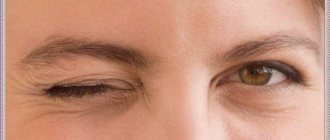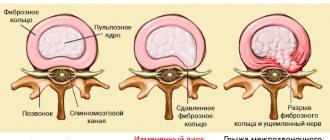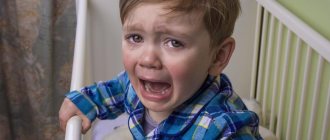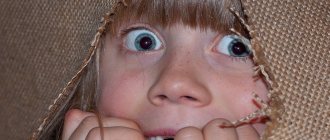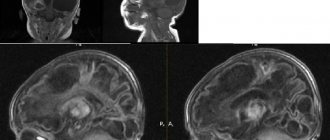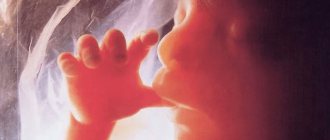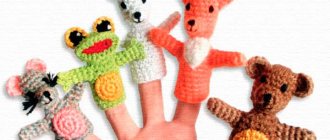The child spent his day actively, walked around, learned a lot of new things and fell asleep. What could be more physiological? But then something incomprehensible happens. The child twitches in his sleep and may wake himself up and cry.
What causes these involuntary movements? What is the cause of restless sleep and do all organs and systems fully rest during it?
Sleep from a physiological perspective
Many parents are sure that during sleep all the child’s vital functions are inhibited. His communication with the outside world is blocked, the senses do not bear any load, and the brain gains strength for subsequent mental work.
This position actually existed until a certain time. Today, many scientists are inclined to conclude that during sleep the activity of certain areas of the brain becomes higher than during wakefulness.
In other owls, the zones that govern a person’s daytime behavior (perception of the surrounding world, physical and mental activity, interaction with other people) “fade into the background” at night. The restoration of their strength occurs in sleep, which generally takes up a third of a person’s entire life.
However, those neurons whose activity increases are able to activate the child’s autonomic functions, provoke sudden movements and even feelings.
How does it manifest itself?
An objective characteristic of sleep is the absence of consciousness and reactions to the world around us. Reduced reflexes give rest to the nervous system.
Sleep does not come to the baby right away. Moving to it from a state of wakefulness, the body goes through several phases (equalizing, paradoxical, ultraparadoxical and narcotic).
Their duration depends on the individual characteristics of the body.
Each of these stages can be accompanied by involuntary motor activity of the baby, especially the initial ones, when the body has not yet completely switched to sleep.
This period when the child shudders when falling asleep is especially typical for infants, who, after emerging from the mother’s womb, are just getting acquainted with the rhythms of their current life.
This is why it is so difficult to put a baby cradled in your arms into bed without waking him up. This is especially true if the stage of falling asleep has not yet ended.
When to see a doctor
Not in all situations, mothers and fathers can help the baby on their own, even if the cause of anxiety seems insignificant to them. In what cases should a child shuddering in his sleep be sent straight to the attending doctor and what possible diseases do these cases indicate?
- Lack of calcium in the body. In addition to shuddering, the baby has excessive sweating, drowsiness, and lack of energy.
- The syndrome of increased nervous excitability is characterized by anxiety, trembling of the chin and frequent regurgitation.
- Epilepsy is a disease that can be treated in childhood. Symptoms include restless sleep, shaking and cramps in the limbs.
These examples do not mean that parents should panic at the first sign of trembling in their baby. However, systematic seizures cannot be ignored.
If a child shudders in his sleep, and experiences nervousness, regurgitation, fever, crying, fatigue, or, conversely, excessive activity, this should be a “bell” for parents, indicating the need to undergo examination at a medical facility.
The symptoms do not have to appear all together; several combinations are sufficient to diagnose the disease.
The level of modern medicine is so high that diseases that were considered incurable just a few years ago are now treated in no time. It is especially important to show your baby all the love and care and pay attention to changes in his behavior and body.
About deep and shallow sleep
The ensuing sleep is also heterogeneous. It contains deep and superficial phases. If in an adult the deep one predominates over the superficial, then in a child it is the other way around. The time spent on deep sleep is several times less than on shallow sleep. That is why, in those moments when the baby is sleeping shallowly, he can “respond” with twitches to loud sounds, jolts of the crib, changes in the position of his body, high or low temperature in the room, and other irritating factors.
This is manifested by throwing away the arms and legs, general twitching, tossing and turning, and the utterance of individual words or sounds.
Scientists have proven that during shallow sleep, emotions experienced the day before can be “scrolled” in the brain. Then children dream. And the peace of sleep depends on their emotional coloring.
By playing very active and active games before rest, overloading the brain with vivid experiences, parents “program” their child for restless sleep.
A newborn twitches in his sleep for reasons completely different from those that cause twitching in adults. In babies, this happens due to their feelings from getting to know a new world for them, an incomprehensible lying position, or an elementary feeling of hunger (in the womb they were not used to eating for hours).
Why do nervous tics occur?
In medicine, the exact mechanism for the development of nervous tics has not yet been identified. According to one hypothesis, pathology is caused by disruptions in the metabolism of neurotransmitters, that is, substances that transmit information through nerve cells. Most often, the problem is hereditary in nature, and it just takes a push for a tic to appear.
- Fear, stressful situation.
- Prolonged mental stress. For example, a child has problems in relationships with a teacher, peers in kindergarten, or an unfavorable family environment (lack of attention or excessive strictness of parents).
- Entering school (first-grader syndrome). The new environment, rules, and restrictions are a strong emotional shock for many children.
- Overwork, systematic lack of sleep, passion for gadgets.
- Past infection (ARVI, etc.).
- Improper nutrition, which provokes a deficiency of calcium and magnesium in the growing body. This can cause muscle spasms. Tick can also be caused by abuse of psychostimulant drinks (tea, cola).
Each of these factors can provoke a nervous tic of the head in a child. The reasons mentioned above lead to the development of primary hyperkinesis. Secondary tics are caused by brain tumors, impaired blood circulation in this organ, encephalitis, mental illness, vegetative-vascular dystonia, etc.
What else could be causing the twitching?
The baby's body is a single whole. Problems in the functioning of one or more organs can manifest themselves in the quality of sleep and calm behavior during it.
Thus, colic, a frequent companion of babies switching from one type of feeding to another, can torment a child so much that he feels pain from it even in his sleep and his legs begin to twitch. To reduce them, he tries to take a forced position of the body, turn so that the pain goes away. It’s not easy to do this in a dream, so these movements look like simple twitches.
Another unpleasant companion for young children is pain from teething. In addition, abundant saliva may flow into the nasopharynx, making it difficult to breathe. The sleeping child reacts to this with sudden movements, as if he is nervous.
Viral infections can cause restless sleep. Sore throat, runny nose (similar to allergic rhinitis), cough - these symptoms interfere with normal breathing and can also cause restlessness during sleep.
The baby shudders, falling asleep: what is behind this
Young parents are often concerned about the question: why does the child shudder in his sleep and cry. This is a consequence of the imperfection of his nervous system, which develops intensively in the first year. Doctors consider this phenomenon as normal.
You should only worry if it is aggravated by other strange, alarming, suddenly appearing symptoms. With normal twitching, do not be alarmed. The baby must be examined by a neurologist; if a disease is suspected, he will prescribe additional examinations.
Varieties of manifestations
When a child twitches before bedtime, during rest, one should distinguish between the types of movements. They are divided into shudders and convulsions. The latter are characterized by prolonged muscle contractions; if the baby is picked up, the seizure does not stop.
If the baby does not have neurological problems, only elevated body temperature can create such a picture. This is also dangerous, because it can damage brain cells, causing irreversible, serious consequences. Particular attention should be paid to hyperthermia in the first month of life. Fast foot syndrome may occur, where the feet can do more than just twitch. During an attack, the foot sometimes bends strongly.
Periods of sleep during which startles occur
A one-month-old baby's sleep consists of slow and fast sleep phases. But unlike an adult, the second one lasts longer. She is characterized by vivid, emotional dreams. This is why a child may shudder, wave his hand strangely, whine, or wake up.
This period is also called the “fast eye phase”, and it is in this period that shudders occur. You may notice strange movements of the limbs, twitching of the facial muscles. If something worries him, the child shudders in his sleep and wakes up. From the age of two months, the structure of rest begins to change.
Prerequisites for the development of the phenomenon
The prerequisite for the occurrence of this phenomenon is primarily prematurity. In such children, the problem is most often observed due to the immaturity of their nervous system. Complications of pregnancy, difficult childbirth, or injuries can also cause twitching in the baby.
Interesting to know! Newborns are born with certain reflexes. When a child has a dream in which he falls or his parents carelessly put him in the cradle, he suddenly throws his arms to the sides and begins to scream and cry. This is called the Moro effect, an innate survival mechanism designed to protect the infant. He tries in this way to restore the lost balance.
Cause for excitement
The reasons that cause an infant to startle when falling asleep may be harmless, but sometimes indicate serious problems in the body. Only a doctor can determine this. But parents should carefully monitor the baby. You should pay attention to the rhythm of shudders, frequency, and the presence of other warning symptoms. These include:
- excessive sweating;
- the baby begins to breathe heavily;
- elevated temperature;
- timidity.
Attention! These manifestations may indicate an inflammatory process, neurological pathologies, diabetes mellitus, epilepsy, and mental disorders. There are tremors due to a lack of microelements and vitamins. This condition must be corrected by a specialist.
Variant of the norm
When a baby flinches in his sleep, this behavior is often the norm. Babies adapt to the world around them and develop, which may be the cause of muscle spasm. More often, premature babies whose nervous system is imperfect are susceptible to this. Overly active children have problems switching from active activities to rest. Their muscles are tired, they cannot relax, and their limbs begin to twitch when falling asleep.
The baby's dreams are vivid and realistic. Seeing them, he shudders, he can smile, laugh, an older child is able to get up.
The process of adaptation to food in the gastrointestinal tract is accompanied by colic and spasms. They cause discomfort to the baby, he may whine, arch, and sleep is disrupted.
During the day, the baby experiences a large number of both positive and negative emotions. They can cause overstrain of the nervous system and muscle twitching. Children often have dreams when they fly somewhere and fail. People say that at this time the child grows, such moments cause fear, anxiety, anxiety. This fear is called hypnagogic, it quickly passes, and the baby is able to fall asleep again.
In what case is this dangerous?
If a newborn twitches frequently and violently in his sleep, the question “why?” The pediatrician should answer. Myoclonus that occurs for no reason can be the result of serious brain disorders or hypoxia of the tissues of the brain centers.
Such diagnoses are made by an epileptologist based on basic and additional examinations, laboratory tests and monitoring of vital signs.
A cramp that cramps the body or part of it can be caused by neurological disorders, hereditary diseases, or genetic pathology.
How to help achieve restful sleep
If parents notice that the child is twitching in his sleep, they should figure out as much as possible under the influence of what factor these movements appear. Among the most common causes that are easy to eliminate are the following:
- a newborn twitches in his sleep if his sleeping conditions leave much to be desired. An example could be a high temperature in the room, a low percentage of humidity, a blanket that is too warm or, on the contrary, unseasonably light. Perhaps an uncomfortable mattress or pillow creates an unphysiological position for the head;
- too noisy around;
- the child did not spend enough time in the fresh air during the day, walks were short-lived or did not happen at all;
- active games took place immediately before bedtime, which led the nervous system to a state of hyperexcitation;
- the daily diet did not meet the baby’s needs in terms of quality or quantity of food eaten;
- living conditions have changed significantly (moving, flying, climate change, buying a new crib for him and other facts);
- sleepwear restricts movement and prevents you from taking a free position;
- diseases mentioned above.
Each baby is unique and different from others, and the pace of its development may also differ. Some skills appear earlier, while others may be delayed. It is often difficult for young parents to understand whether their child is developing according to age.
“Don’t panic and don’t invent illnesses for your child!” – thanks to precisely such “calming” advice, many children end up seeing a specialist much later than they should. If you hear them too, but still feel that something is wrong, consult a doctor! Below are ten signs that your baby may not be developing as expected. If any of these sound familiar, don't listen to "good advice" and take action.
- The child is not gaining weight. Babies at different stages of their development may gain weight faster or slower. Sometimes this is influenced by additional factors, such as a cold or inflammation of the urinary tract, which can lead to the baby being slightly behind in weight. However, a sharp and prolonged inhibition of weight gain is something else. Sudden loss of weight already gained requires special monitoring. Such situations require a broader diagnosis and exclusion of serious violations
- The child constantly screams. It may happen that a completely normally developing child reacts to discomfort by crying. However, every healthy baby also has very long periods of quiet wakefulness and sleep, and these should be significantly longer than the crying time. If you have the impression that your baby cries almost non-stop, don't fool yourself. There is a chance that the child is suffering from pain, for example due to infection or inflammation. Immediate consultation with a doctor is necessary.
- The child is not interested in the environment. This behavior is often perceived as a manifestation of good manners and a calm character. Unfortunately, this approach often delays diagnosis and treatment. A child may be naturally calm, but he should still be interested in his environment. If you have the impression that contact with your child is difficult, that he is not interested in you, brothers and sisters, or toys, contact a specialist. The cause may be autism, deafness and many other disorders.
- A few months after birth, the baby does not focus on your face or toys. Of course, your child's development does not have to be “textbook”. Some babies focus on faces and objects at three months, others only at four or five months. However, if the situation does not change after the first six months of the baby’s life, it is no longer possible to talk about the individual pace of development; this is a symptom of a disorder associated with visual defects.
- The child spits up very often. There are children who do not spit up at all, and there are those who spit up quite a lot. Both of them can be quite healthy. However, if your baby burps several times immediately after eating, trust the experts.
- The child walks on tiptoes. Walking on tiptoes is quite normal for a child who has recently started walking. But if after several months nothing changes, this may indicate a problem with the Achilles tendon or tissue. It is worth consulting a neurologist.
- At one and a half years old, the child does not respond to his name. Already a one-year-old child should automatically turn his head after someone says his name. If he doesn't do this, it's always a cause for concern. The most common causes of this anomaly are hearing problems or autism.
- The child does not speak. A 2-year-old should talk, and don't be fooled by stories like "my niece's cousin started talking at age 4 and boys generally start talking later." Another thing is the number of words in a child’s vocabulary. There are two-year-old children who speak only a few words, but besides these they also use a lot of gestures. Such a child will quickly make up for lost time in the coming months. It’s another matter when the child doesn’t speak at all and doesn’t even know gestures.
- A three-year-old child has poor motor coordination. Some children are said to be “clumsy” if their motor development differs markedly from their peers. Don't let this label attach to your child. The backlog in this area requires rehabilitation. If your 3-year-old is still stumbling, has difficulty walking up stairs, is still drooling, and is still slurring his speech, see a neurologist and ophthalmologist. These symptoms may indicate vision problems or problems with muscle tone.
- A three-year-old child has cognitive problems. Properly developing three-year-old children love to play in a group, draw, play with toys, and are already able to concentrate on one operation for several minutes. If you see that your child’s cognitive development is progressing differently, react. Alarming symptoms: reluctance to draw, lack of interest in toys, games and difficulty concentrating. The cause may be hypoxia during childbirth or nervous system disorders. Contact your pediatrician! Reacting to early signals of disturbances is not “excessive panic” and “inventing illnesses for the child.” This is a manifestation of maturity and responsibility - only you, the parents, are responsible for ensuring that your child receives help on time.
Doctor – pediatrician Shabelnikova Ya.I.

